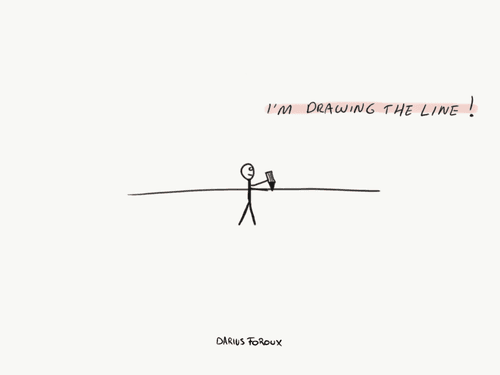How To Be More Assertive - Darius Foroux
Curated from: dariusforoux.com
Ideas, facts & insights covering these topics:
8 ideas
·399 reads
Explore the World's Best Ideas
Join today and uncover 100+ curated journeys from 50+ topics. Unlock access to our mobile app with extensive features.
I learned to be assertive from my mother. She always expresses her feelings, is comfortable with saying no, acts in her family's best interest, and also thinks about the common good.
She's the most assertive person I know. No one can take advantage of her. If you try, she will let you know about it. And you won't like it.
What is assertiveness actually? Robert E. Alberti and Michael L. Emmons are considered the lead experts in this field. Their book Your Perfect Right , first published in 1970, is considered a classic on the topic. They define assertive behavior as follows:
87
66 reads
In general, there are three types of behavior:
- Passive : Indirect, dishonest, does not take control, is nice at all cost, focuses on others.
- Assertive : Direct, honest, self-worth, to the point, focuses on the self, respects others.
- Aggressive : Harmful, egocentric, will to win at any cost, justifies the means, wants to control others.
85
48 reads
If you watch our society, most behavior happens at the extremes. How often do you experience dishonesty at home, with your friends, and at work? It's not always because people have evil intentions. Too often, it's because most people are passive. They are afraid of the confrontation, and instead, they prefer to lie.
84
53 reads
But there are also a lot of aggressive people. People say that aggression is becoming more common in the world. I don't know about that, but I do know that no one wants to be around aggressive people.
The middle is where you want to be. You want to be respectful, firm, and not aggressive. That's what assertiveness is all about.
But how do you become more assertive? Like anything in life you want to improve, you must practice. And the best way to practice is on aggressive people and in confrontational situations.
82
40 reads
Next time you experience a stressful situation or when you must deal with an aggressive person, do the following: Detach from the person and situation. Tell yourself you're observing the situation.
You never want to get emotionally involved. That's the most important thing if you want to be more assertive. And once you're detached, you simply get to the point. I know this sounds vague, so let me give you an example.
The other day I called a construction company that's supposed to fix a leakage problem I had at my apartment. The guy tried to brush me off and wasn't too subtle about it: "We don't have anyone right now."
83
53 reads
I paused, detached from the situation, realized it wasn't personal, and said: "What am I supposed to do? Let everything go to waste when it rains? What would you do?"
It went on like that for a while until he finally said, "Alright, fine, I'll come by myself." Two hours later, he came to my apartment and fixed the leakage. Problem solved.
Often, we escalate situations that are not necessarily bad. That's because we allow them to become personal. But we must realize that other people have their own issues. It's never personal. Or, we do the opposite: We do everything to avoid escalation. But that only works against us.
82
48 reads
In the past, if something like this happened, I would say, "Okay. When can you send someone over?" And then I had to wait. That's classic passivity.
In this world, you have to be assertive to get what you want. You don't have to act like a bully, but you have to be a little demanding. I see it as honesty. I was simply honest with that guy. I had a problem that needed to be fixed.
When we become more assertive, we need to be careful not to overdo it. Otherwise, we risk becoming aggressive or overly dominant. Recent research showed that informal leaders were more liked and respected when they had "a moderate amount of assertiveness and warmth."
82
44 reads
That's very accurate. When we are too nice, we risk that people take advantage of us. When we are too aggressive, we push people away. But if we're direct and are respectful to people at the same time, we can get much more done together.
Unfortunately, you only become more assertive by being more assertive. You must practice. What helps is to see every social situation as a negotiation.
I highly recommend reading Never Split The Difference by Chris Voss. In fact, I learned the "How am I supposed to do that?" technique from that book. When people give you a proposal you don't like, ask them that question. In my case, I changed it to " What am I supposed to do?"
85
47 reads
IDEAS CURATED BY
Stasher 535066's ideas are part of this journey:
Learn more about corporateculture with this collection
How to find inspiration in everyday life
How to stay motivated
How to cultivate a positive mindset
Related collections
Similar ideas
3 ideas
How To Be More Assertive - Darius Foroux
dariusforoux.com
11 ideas
11 Ways To Be More Assertive
healthline.com
8 ideas
The Impact of Assertiveness
psychologytoday.com
Read & Learn
20x Faster
without
deepstash
with
deepstash
with
deepstash
Personalized microlearning
—
100+ Learning Journeys
—
Access to 200,000+ ideas
—
Access to the mobile app
—
Unlimited idea saving
—
—
Unlimited history
—
—
Unlimited listening to ideas
—
—
Downloading & offline access
—
—
Supercharge your mind with one idea per day
Enter your email and spend 1 minute every day to learn something new.
I agree to receive email updates

